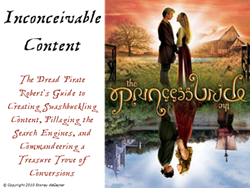I was talking with a client the other day about how to optimize their content. They kept saying, in a way of trying to understand what they need to do to improve their website, that what they need to do is to create a bunch of content and keep using their keywords over and over.
Uh… no.
That might work in politics, where saying something enough times gets people to start believing it’s true. But, not online.
People are pretty adept at sniffing out the fakes. If your readers come to your site and just see a lot of unnecessary repetition of your keywords, they are going to see right through that. Even if they don’t realize it on a conscious level, their spider-senses will kick in, and they’ll walk away just because they are not “feelin’ it”.
The issue is one of trust. Your readers may not be able to quite put their finger on it, but something will feel… off. And that’s when visitors start to run away.
Build content people trust

No Hype: A lot of people like to use hype. We see it all the time in commercials, billboards, and magazines. That’s been going on for years and people have become accustomed to it. But the web is still new, and people use it for all kinds of things like research, business, shopping and more. This has made hype far less desirable in the online sphere.
Don’t make claims that cannot be substantiated. Don’t claim to be “the best” or the “#1” or “the ultimate” unless you can back that up with third party verification. Claiming you’re the best because you want to be doesn’t make it so. People get suspicious of such claims.
Be Genuine: Write your content as if you were talking to someone face to face. Use a conversational tone that is both helpful and free of superfluous fluff. Don’t go out of your way to tell outlandish stories or make claims that will appear too-good-to-be-true. Neither stories or verifiable claims are wrong, but how you present them is important to coming across to your readers as genuine.
No Hidden Text: Back in the old days of SEO, people used to write content and color it white on a white background to hide it from the readers. That’s a sure sign that what you have to say blows chunks! Today, you can “hide” content with CSS, but there is a right way and a wrong way to do it. If you’re hiding content to make it more difficult for readers to find it, that’s the wrong way. If you’re hiding content to make your page more usable, and the reader can easily find it with a simple click or mouse-over, that’s the right way.

When it comes to hidden text, intent matters. In other words, why is it hidden? Where is the content going? Why does it need to be hidden?
But, the most important question? Whether or not the text is valuable. This one matters the most. If the content is valuable, then your visitors need to be able to read it. If it’s not valuable, then it shouldn’t be on the page to begin with.
Negative Reviews: If you’ve got a product site or a blog, and people have the opportunity to write negative comments or reviews, you can’t only allow the good stuff. Nobody is going to believe that 100 of 100 reviews are positive. You lose credibility immediately.
In fact, negative reviews can help sell a product. If the reader can see all the negative things people have to say, they at least have a more well-rounded picture of what they are purchasing. They can use the negative reviews to determine that the good outweighs the bad, and they’ll be less likely to write a negative review themselves because they know what they are getting into.
If your readers cannot trust you, they won’t engage you for business or whatever else you want them to do. Your content is the first impression your visitors will have of you, so you have to make sure that you give them a good first impression rather than a jumbled mess of “keyword optimized” content. It all goes back to writing for your visitors first.
 This post was inspired from The Princess Bride themed presentation I gave in early 2010 at SEMpdx’s Searchfest titled Inconceivable Content: The Dread Pirate Robert’s Guide to Creating Swashbuckling Content, Pillaging the Search Engines, and Commandeering a Treasure Trove of Conversions. If you enjoyed this post you also might enjoy other posts inspired from the same. Search for “inconceivable content” on this blog to find them all.
This post was inspired from The Princess Bride themed presentation I gave in early 2010 at SEMpdx’s Searchfest titled Inconceivable Content: The Dread Pirate Robert’s Guide to Creating Swashbuckling Content, Pillaging the Search Engines, and Commandeering a Treasure Trove of Conversions. If you enjoyed this post you also might enjoy other posts inspired from the same. Search for “inconceivable content” on this blog to find them all.
